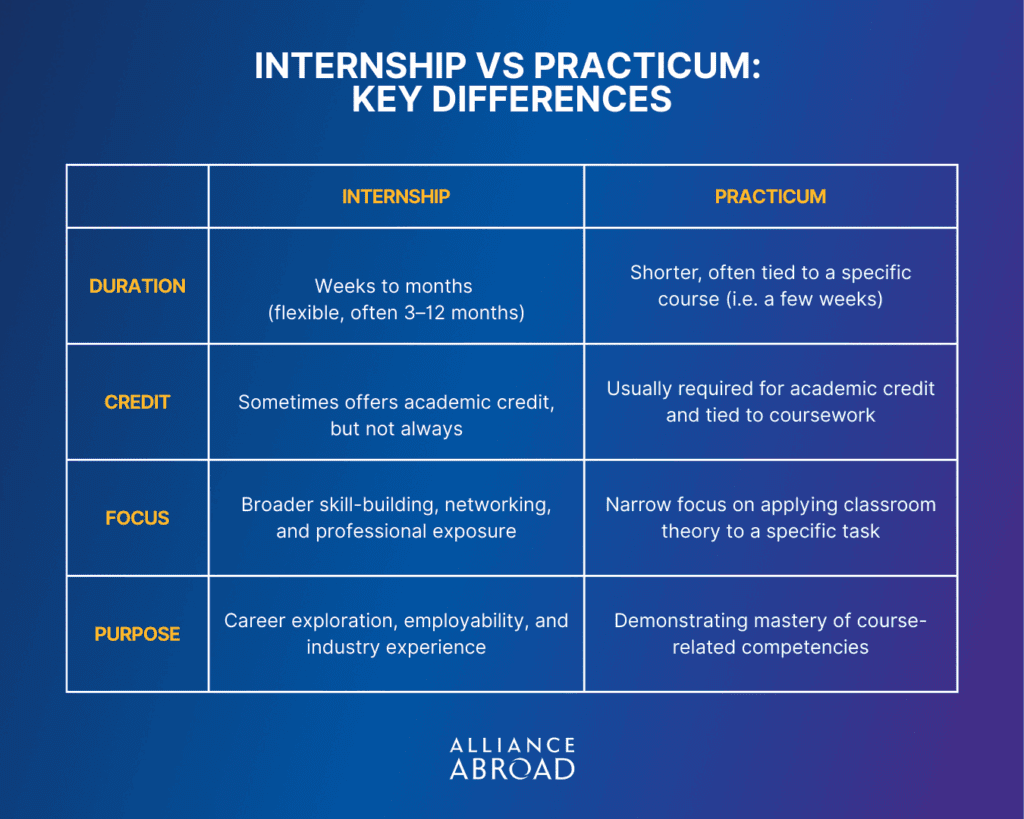Today, more and more students and young professionals are looking abroad to gain international experience. Not just to build their careers, but to live unforgettable moments. Internships in places like the United States or Spain help you make your resume stand out to future employers. And along the way, you’ll collect stories, friendships and skills that will shape your career, and also who you are.
With our programs, you’ll combine professional growth with cultural exchange, so you don’t just learn how to work, but also how to thrive in a global environment. In this guide, we’ll walk you through everything you need to know.
Internship Basics: How It Works & Why It Matters
What is an internship? An internship is one of the most effective ways to bridge the gap between studying and working. Whether in hospitality, culinary arts, or other fields, an internship offers structured, hands-on experience that helps you build valuable skills, expand your network, and prepare for your career.
Unlike regular jobs, cultural exchange internships are designed with learning at their core: they blend training, mentorship, and exposure to professional settings.
Internships abroad can be full-time or part-time, paid or unpaid, short-term or long-term, depending on the field and country.
In areas like hospitality and culinary arts, internships often combine on-the-job practice with cultural exchange opportunities, giving participants professional growth and international exposure.
Did You Know: Paid interns are more likely to receive full-time employment and higher salary offers than unpaid interns.
Internship vs Practicum: What’s the Difference?

From Paid to Cultural Exchange: Internship Types Explained
- Full-time internships – immersive, typically during summer or a semester break.
- Part-time internships – flexible and perfect for students balancing study and work.
- Paid & unpaid internships
Did You Know: Even though a stipend is not required by the program regulations, we only work with host employers who agree to pay an hourly salary to their Interns and Trainees. So, all our placements with Alliance Abroad are paid.
The Real Goal of an Internship
The main goal of an internship is to bridge the gap between education and employment. Participants gain:
- Practical experience in their chosen field.
- Skills like teamwork, communication, and problem-solving.
- Industry insights and professional contacts (improving employability).
By the end of an internship abroad, participants walk away with both professional confidence and a stronger resume. Making them stand out in today’s global job market.

Internships Abroad: Career + Culture + Growth
Beyond just learning the ropes of a job, international internships combine career development, cultural exchange, and personal growth all at once. Whether you’re aiming for a hospitality internship in the USA or a culinary internship in Spain, the benefits extend far beyond the workplace.
Grow Your Skills & Boost Your Career
You’ll develop both technical and soft skills. Culinary interns refine their kitchen techniques, while hospitality interns master guest relations, service standards, and leadership skills. These experiences directly boost employability and prepare you for more global career opportunities.
Learn More: 9 Reasons to Do a Culinary Internship in Spain.
Connections That Last Beyond the Internship
An international internship puts you in contact with industry professionals, mentors, and peers from around the world. The relationships you build can lead to future job offers, collaborations, and valuable references. All our Alliance Abroad’s internships make mentorship a core part of the experience.
Learn by Living Abroad
Living and working abroad is a cultural exchange. You’ll practice a new language, adapt to different work styles, and gain the intercultural skills employers value in today’s global workforce.

Earn, Learn & Strengthen Your CV
One of the best perks of cultural exchange internships is that many programs offer paid opportunities so you can earn money and gain career-defining experience at the same time. And not to brag, but at Alliance Abroad we only offer paid internship placements. We believe your hard work deserves recognition).
Beyond the paycheck, the real payoff is how your internship transforms your resume and personal brand. Employers don’t just see job titles; they notice the story behind your experience. International work instantly signals that you’re adaptable, independent, and globally minded, all these are abilities recruiters love in top candidates.
Extra Tip: Don’t just list your internship job abroad. Showcase it. On LinkedIn or your CV, highlight specific achievements, such as:
- “Trained in Michelin-starred kitchens in Spain, mastering advanced culinary techniques.”
- “Led guest services at a U.S. five-star resort, supporting an international team and diverse clientele.”
By framing your experience this way, you turn your internship abroad into a powerful career asset, one that makes your application stand out from the crowd!
Read More on: Benefits of International Culinary Experience

Hospitality, Culinary & More Internships: Paths to Explore
Not all internships are the same. Depending on your field of interest, the type of internship you choose can shape your skills, your career direction, and even the way you experience life abroad. We specialize in programs that combine career growth and cultural exchange, particularly in the hospitality and culinary industries, but there are also other pathways worth knowing.
Culinary Internships Abroad
Perfect for aspiring chefs, pastry chefs, or culinary professionals, these internships focus on kitchen training, restaurant operations and more. Participants often work alongside world-class chefs in high-end hotels, resorts, or Michelin-starred restaurants.
Hospitality Internships Abroad
Hospitality internships cover hotel management, food & beverage service, front desk operations, and event planning. They’re ideal for students or graduates looking to master guest relations and service excellence in global destinations.
Cultural Exchange Internships
Some internships are designed to build soft skills and cultural awareness. These programs may include summer camp placements, language practice, and opportunities to learn through immersion. They’re valuable for developing global perspectives and adaptability.
For example, at Alliance Abroad, we integrate cultural exchange into every program, making sure our participants work abroad but also live like locals, connect with communities, and grow personally.
For example, at Alliance Abroad, we integrate cultural exchange into every program, making sure our participants work abroad but also live like locals, connect with communities, and grow personally.
Self-Arranged Internships
Some choose to arrange their own internships abroad. While this offers flexibility and independence, it also comes with challenges, for example: navigating visas, housing, and employer reliability. But not to worry! We can help you with the process, with a structured, supported experience while still meeting your career goals.
Get More Information: Self-Arranged J1 Visa Program

The Best Time to Do an Internship
Timing matters. Deciding when to do an internship can shape the kind of opportunities you’ll access and how the experience fits into your long-term goals. As mentioned in the sections above, cultural exchange internships are flexible. You can join them as a student during semester breaks, right after graduation, or even later in your career if you’re looking to reskill or pivot into new industries like hospitality or culinary arts.
Some participants even return for a second or third internship to keep building their international portfolio.
Right After College: Getting Ahead Early
Graduating doesn’t mean the learning stops. Doing an internship right after college allows you to apply theory directly in the workplace, gain confidence, and stand out to recruiters with real-world experience. It’s especially helpful for those who want to work abroad early in their career.
Switching Paths or Gaining Experience
Internships aren’t just for students. Professionals looking to re-skill or change industries can use internship jobs abroad as a structured way to test a new path, such as moving from general tourism into luxury hospitality.
Doing More Than One Internship Abroad
Many participants choose to come back for a second or even third internship, often in different countries. A summer internship in the U.S. could be followed by a culinary placement in Spain, creating a layered global resume.

Steps to Getting an Internship Abroad
Breaking it into steps makes the process much smoother. From researching opportunities to securing your visa, here’s a roadmap to help you qualify and stand out.
Step 1: Research & Choose Programs
Start by exploring programs that match your skills, career goals, and interests. For example, culinary students might prefer placements in Spain, while hospitality majors may choose U.S. resorts. Our programs offer placements in both industries to help you find the right fit. View our Programs here.
Step 2: Prepare Your CV & Cover Letter
Your application materials should highlight not just education, but also achievements, soft skills, and any prior experience. Tailor your CV to the role you want. For guidance, check out our Essential Tips for Nailing Your Culinary & Hospitality Internship Interview.
Step 3: Submit Application & Attend Interviews
Most interviews are conducted online. Be ready to discuss your skills, motivation, and cultural adaptability. Employers value professionalism and a positive attitude as much as technical expertise.
Step 4: Secure Visa & Accommodation
Depending on the country, you may need a J1 visa (USA), a training visa, or other work authorization. We assist with paperwork and guidance from day one, and we’ll offer recommendations with housing arrangements to make your transition easier.
Step 5: Begin Internship & Network
Once you arrive, focus on maximizing learning opportunities. Ask questions, take initiative, and build connections with colleagues. The network you develop abroad can open doors for your future career.
Pro Tips for Success
Stand out with these extra steps:
- Before your internship, it’s always good to take a short language course to ease communication and start practicing the language.
- Don’t forget to add relevant industry certifications to your resume (e.g., food safety, hospitality management).
- Be confident. Showcase flexibility and initiative during the program.
- Document your achievements, share photos, and milestones. This will be helpful for your CV or LinkedIn profile as well.
Remember: To qualify for an internship abroad, you generally need to be a student, recent graduate, or early-career professional under 35 years old, with relevant skills, meet visa requirements, and show motivation and adaptability.

Paid vs Unpaid Internships: Pros & Cons
One of the most common questions students ask is: “are internships paid?” The answer is: it depends. Some hospitality internships include a salary, stipend, or housing allowance, while others may be unpaid but still provide valuable hands-on learning and career connections. Both options can boost your resume, but the right choice depends on your goals and financial needs.
- Paid internships: Include wages, stipends, or in-kind benefits (such as meals or housing).
- Unpaid internships: Provide training and experience, but no direct financial compensation.
Pros & Cons of Paid Internships
- Financial support covers living costs.
- Often come with structured training and mentorship.
- More competitive, fewer placements available.
Pros & Cons of Unpaid Internships
- Opportunity to gain experience when paid options are limited.
- Flexible schedules, especially for short-term placements.
- No financial compensation; may require external support.
Alliance Abroad Paid Options
All our international opportunities are paid placements. Whether you join a hospitality or culinary internship in the USA or a culinary internship in Spain, you’ll receive financial support to help cover your stay.
Plus, internships in Spain include housing and meals. Yes, you read that right! And for self-arranged internships, we also assist with J1 visa sponsorship and guidance.

Best Countries for Internships Abroad
When it comes to internship jobs abroad, certain destinations stand out for their opportunities, structure, and cultural value. For those pursuing careers in culinary arts or hospitality, the USA and Spain are two of the most popular (and rewarding) choices.
USA Internship Opportunities
The USA is known for its diverse culinary scene and world-class hospitality industry. Our participants gain hands-on training in restaurants, resorts, and luxury hotels. Programs typically run 6–12 months, providing structured mentorship, paid stipends, and opportunities to network with leading chefs and hospitality professionals.
Important: Intermediate to advanced English is required.
Spain Internship Opportunities
Spain is a dream destination for culinary interns who want to immerse themselves in Mediterranean cuisine, pastry arts, and fine dining. Programs often last 3–12 months, with placements in high-end restaurants and hotels.
Basic Spanish is a requirement for applying.
Highlight: Housing + Meals covered.
Internships Abroad Are Worth It!
Internship jobs abroad are career accelerators and life-changing experiences. Whether you’re developing new culinary skills in Madrid, Spain, or mastering guest services in Florida in the U.S., each opportunity helps you grow personally and professionally.
Cultural exchange internships boost your employability, expand your global network, and make your CV stand out in today’s competitive job market.
If you’re ready to combine career growth with cultural adventure, we can help you get there. Our programs are designed to fit your goals.



